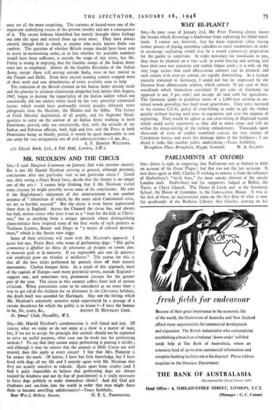MR. NICOLSON AND THE CIRCUS
Snt,—I read Marginal Comment on January 2nd with extreme interest. But is not Mr Harold Nicolson arriving at general, although personal, conclusions after one pariicular visit to one particular circus ? Could one, after seeing a Palais Royal farce, decide that the theatre is no longer one of the arts ? I cannot help thinking that if Mr. Nicolson visited more circuses he might possibly revise some of his conclusions. He asks if the Englishman's enjoyment of this entertainment is not another instance of " infantilism of which, by the more adult Continental critic, we are so harshly accused." But the, circus is even better appreciated there than in England. Across the Channel the circus has, and always has had, serious critics who treat it not as a " treat for the kids at Christ- mas," but as anything from a unique spectacle whose distinguishing characteristics have inspired some of the best works of such painters as Toulouse Lautrec, Renoir and Degas to " a means of cultural develop- ment," which is the Soviet view today.
Some of their criticisms will meet with Mr. Nicolson's approval. I quote but one, Pierre Bost, who wrote of performing dogs: "Des qu'on commence a affubler les bites de vitements de poupie on tombe dans le mauvais gout et Irt niaiserie. Ilest regrettable que tent de patience soit employee pour un resulutt si mediocre." The reason for this is that all the best tricks performed by animals show off their natural movements. Clothes hamper them. As a result of this approach, most of the capitals of Europe—and many provincial. towns, outside England— support one, and sometimes two, permanent circuses for the greater part of the year. The circus in this country suffers from lack of serious criticism. When pantomime came to be considered as no more than a way to get rid of the children for an afternoon in the Christmas holidays, the death knell was sounded for Harlequin. May not the feeling which Mr. Nicolson's extremely sensitive mind experienced be a presage of a certain decadence for which the public is to blame ?—I have the honour to be, Sir, yours, &c., ArrroNv D. HIPPISLEY Coxe. St. lames' Club, Piccadilly, W.1.


































 Previous page
Previous page